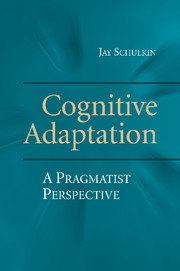Book contents
- Frontmatter
- Contents
- Preface
- Introduction
- 1 Cognitive Adaptation, Objects, and Inquiry
- 2 The Human Situation: Uncertainty and Adaptation
- 3 Time and Memory: Historical Sensibilities
- 4 Educational Sensibilities
- 5 An Instinct for Spiritual Quests: Quiet Religion
- Conclusion: Demythologized Reason
- References
- Index
2 - The Human Situation: Uncertainty and Adaptation
Published online by Cambridge University Press: 08 August 2009
- Frontmatter
- Contents
- Preface
- Introduction
- 1 Cognitive Adaptation, Objects, and Inquiry
- 2 The Human Situation: Uncertainty and Adaptation
- 3 Time and Memory: Historical Sensibilities
- 4 Educational Sensibilities
- 5 An Instinct for Spiritual Quests: Quiet Religion
- Conclusion: Demythologized Reason
- References
- Index
Summary
When students of mental evolution discovered how great a role symbols have played in science, they were not slow to exploit that valuable insight.
– Susanne Langer, Philosophy in a New KeyHumans in the modern world still dwell in a world of contingency and abject uncertainty. Amid this uncertainty is the use of instrumental reason – reason devoted to coping with the lack of certainty in the search for the stable and somewhat secure. Although this state may create great grief and angst (e.g., Heidegger, 1927/1962), it also prompts action and inquiry. Pragmatists such as Dewey emphasized the plasticity of the modern world, the many diverse forms of adaptation and human expression (Margolis, 2002). Dewey (1925/1989) also noted, perhaps somewhat hopefully, that “the natural and original bias of man is all toward the life objective” (p. 14).
Problem solving is rooted in the existential condition of coping with our surroundings. Knowing occurs in interactions with others and with the world, which is a core pragmatist perspective. The knowing process takes place in the life world that we are adapting to, coping with, and trying to make sense of (Dewey, 1925/1989; Godfrey-Smith, 2002).
This chapter begins with an evolutionary account of the cognitive/behavioral adaptations that underlie our sense of agency and inquiry. Coping with and adapting to change are fundamental to a pragmatist perspective (e.g., Johnson, 2007; Schulkin, 1992; Smith, 1970).
- Type
- Chapter
- Information
- Cognitive AdaptationA Pragmatist Perspective, pp. 38 - 66Publisher: Cambridge University PressPrint publication year: 2008



